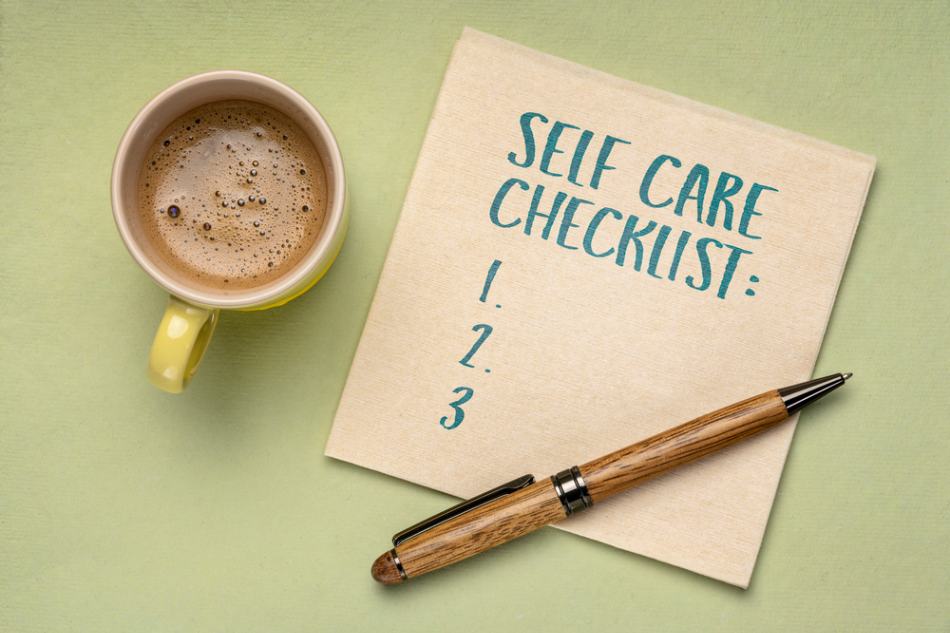April 9, 2020
Webinar: Strategies for Effective Communication in Relationships
Written by Rachel Eddins
Posted in Relationships, Couples, Marriage, Webinars and with tags: Communication, Relationships, couples

Healthy communication is the foundation of a strong marriage.
- Are you having trouble communicating with your spouse?
- Does it feel like you are always misunderstood?
- Do simple or silly topics of discussion often turn into massive blow-ups?
Please join us to learn new effective ways of communicating with the people we love the most.
Facilitated by Jenet Dove.
Watch a replay of the presentation here.
Learn more about our couples counseling services.
Here is a transcription of the webinar:
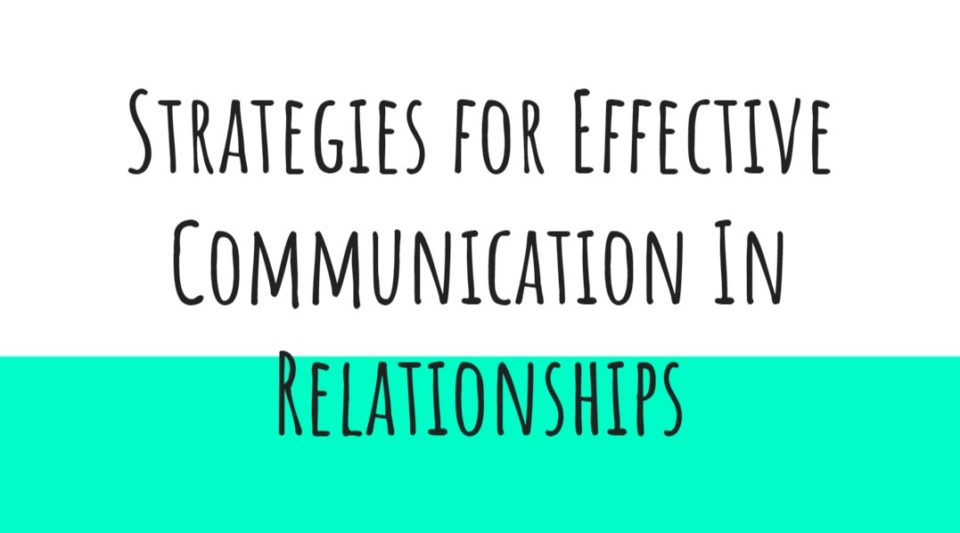
Effective communication and relationships, whether that relationship is just dating, whether you’ve been married, or married for years and years. This is a topic that I’m very passionate about and I’m really happy to have such a large attendance and be able to provide these tools and tips for you guys. So let’s go ahead and get started.

My name is Jenet Dove, I’m a licensed clinician at Eddins Counseling. I work closely with individuals who struggle with anxiety, depression, shame, and difficult negative thoughts. I also work closely with couples and enjoy doing premarital counseling, as well as couples in marriage counseling. Depending on your needs, I might pull a little bit from cognitive behavioral therapy or attachment theory, or solutions-focus therapy. And when I’m doing a couple of sessions, I draw heavily from the Gottman model and I’ll be talking quite a bit about Dr. John Gottman today during our session as well.
So we’re going to go ahead and get started. Here we go. So I’m really, really excited to be here to present on this topic of developing effective strategies for communicating in your relationship.
One thing I enjoy most about working with couples is helping them develop a culture of healthy communication in their relationship. Every strategy that I’m going to present to you today will be based on evidence-based research, which I think is extremely important. Before we dive into those strategies, I would like to start off by presenting some research that informs the purpose of today’s presentation and why it’s critical to develop communication habits that are intentional and effective and sustain the life of your relationship.
The Ugly Truth

I’m going to start with the ugly truth.
This is a well-known statistic. If you research marriage and divorce rates in our society, you’re going to see this number pop up and I think it’s worth starting our webinar with. So the APA, the American Psychology Association, confirms that while in Western cultures over 90% of people marry or desire to be married, between 40 to 50% of those marriages, in the United States specifically, end in divorce.
But Why?

With such a high desire for marriage, it’s interesting that the statistic for divorce is still high as well. So that begs the question, why? According to some more research I did, the most common reasons that were reported for divorce (these are in no particular order) were financial reasons or money, lack of intimacy, some couples reported that they married way too young, infidelity, lack of commitment, a lot of couples listed irreconcilable differences as the reason for divorce and that could mean anything between a difference in values and difference in beliefs in a conflict that just could not be resolved, and then, of course, communication.
Communication
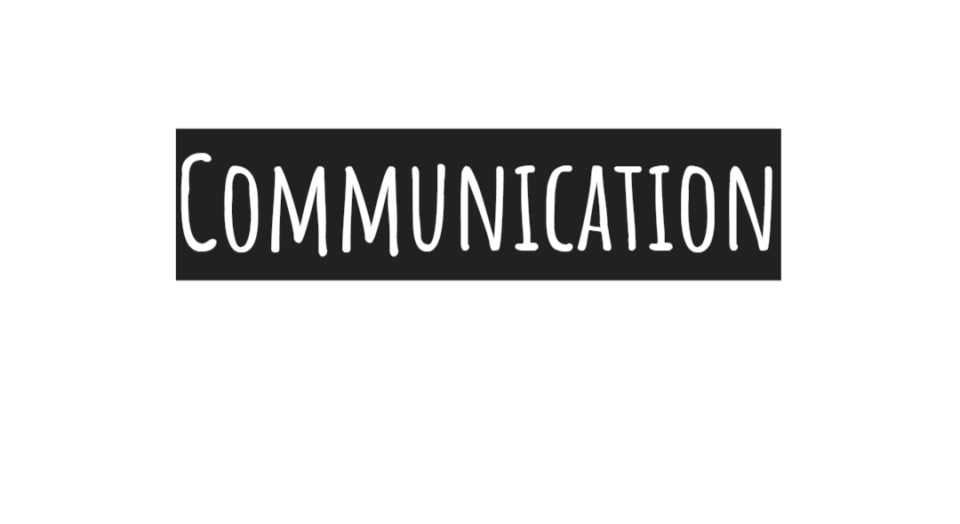
Of all the articles that are researched, of all the lists that I looked at for reasons for divorce, communication was at least in the top three or top five. For our remaining time together, I’m going to share a few evidence-based strategies for creating a culture of healthy communication in your relationship. I love the phrase “The culture of healthy communication” and I think that’s very important to develop.
When I work with couples, whether it be for premarital work or couples therapy, I used to spend a handful of our sessions focusing on communication. I find that at the core of most issues, including whether it be money or intimacy, is truly the inability to communicate our true feelings and emotions in a healthy way. Regarding that concern, we kind of struggle with communicating those problems in a way that promotes healthy dialogue as opposed to reinforcing habits that stifle communication.
During my sessions, I’m going to pull heavily from the work of Dr. John Gottman, who is a well-known researcher and psychologist in the field of marriage therapy. Dr. Gottman is most known for his famous study, a long-term research study, which included observing the interactions of over 700 couples.
Gottman, during this observation, discovered certain factors that distinguished happy and stable couples from both unstable couples and couples that had ultimately divorced and were unhappy.
Throughout this study, he was also able to develop a method that allowed him to predict with over 90% accuracy which of these couples would divorce and which ones would remain married. You’ll notice that I pull a lot from his research. I think it’s really evidence-based and these are very sound techniques.
As we’re going through this, I just want to let you know that we will be following up with some resources that kind of highlight the main core concepts that I’m going to be going over today. So I don’t want you to feel like you have to take detailed notes. I’m going to make sure that you walk away by tomorrow evening with the resources that you need to kind of reinforce and help you remember some of these strategies.
The 4 Horsemen

One of the core pieces of Dr. Gottman’s work is the 4 Horsemen of the Apocalypse. This is a metaphor that depicts the end of times that are illustrated in the New Testament. Dr. Gottman uses this metaphor to describe four communication styles that, according to his research, can predict the end of a relationship.
Those four communication styles, the four horsemen, are:
- Criticism
- Contempt
- Defensiveness
- Stonewalling
I’m going to take some time now to dive deeper into each of these four horsemen. I’m going to provide examples as well as a context for strategies that allow us to avoid creating a culture of communication in our marriage that’s based on these negative communication styles. As I’m reviewing each of these styles of communication, I want you to keep track of which ones you can identify with in your relationship, some of your past relationships, or maybe some that you noticed from your partner. Try to keep track of those and we’ll talk about that after we go over the four horsemen. So let’s dive deeper into these.
Criticism
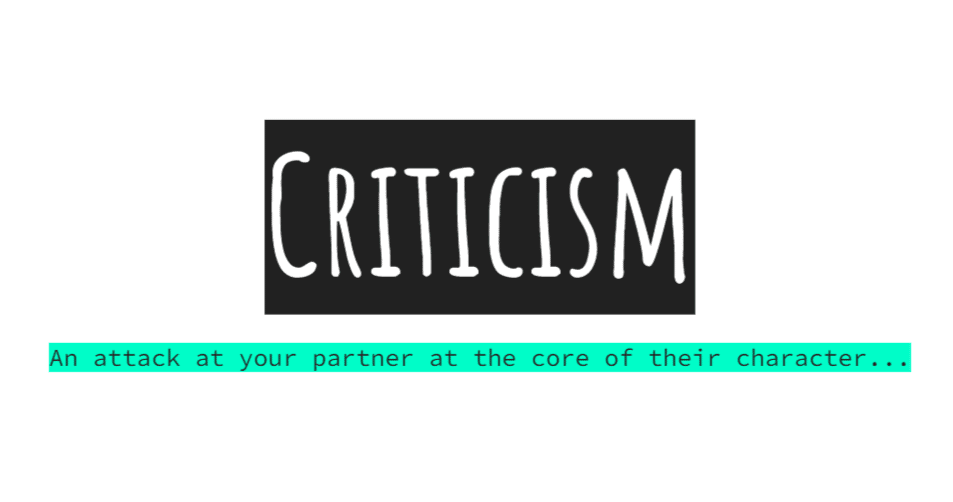
Let’s start with criticism. When you criticize your partner in communication, you are verbally attacking their personality or character. Oftentimes criticism gets confused with voicing a complaint or offering a critique. When you make a complaint or a concern, you’re talking you’re doing it in a way that addresses a specific issue, whereas when you’re criticizing someone, you’re attacking your partner at the core of your character. Here, it gives us an example of that:
“You never think about how your behavior is affecting other people. I don’t believe you are that forgetful, you’re just selfish. You never think of others! You never think of me!”
This sentence, this quote is very critical. There’s a lot of criticism in there and that’s kind of attacking the person, their character. Different from stating a complaint or concern:
“I was scared when you were running late and you didn’t call me. I thought we had agreed that we would do that for each other.”
This is addressing the concern, the issue at hand, rather than attacking the person’s character or personality. So that’s criticism.
Contempt
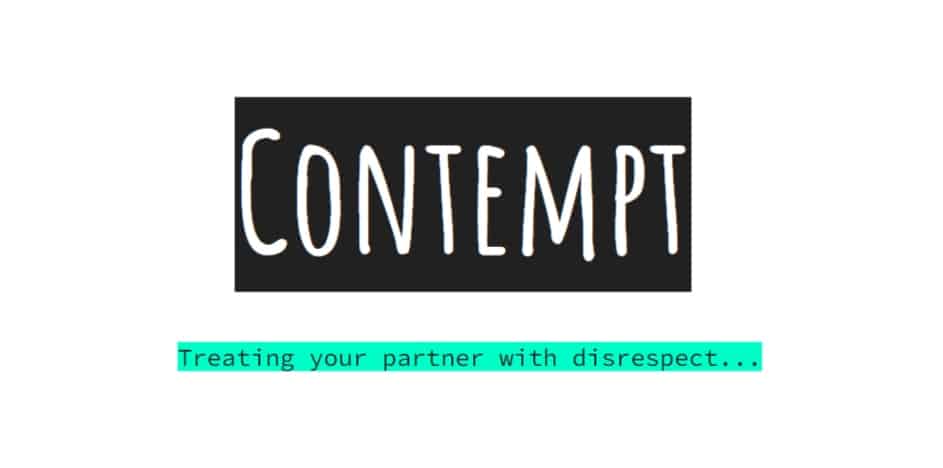
Then we have contempt. When we communicate in this style, we are being truly mean, and we’re being truly disrespectful. We’re mocking our partners, ridiculing them, or name-calling. Our body language is off-putting and we’re talking in a way that just really kind of shows disgust. The target of your contempt is to make your partner feel worthless.
Contempt goes way far beyond criticism. While criticism attacks your partner’s character, contempt assumes almost a position of superiority over them. You’re talking down on them almost like they’re beneath you. Contempt is usually fueled and festered by negative thoughts that you’re having about your partner. You have these repetitive negative energy and thoughts about them and that usually comes to a head when your partner and you get into some type of disagreement.
It’s very important to note Dr. Gottman from his research has identified contempt as the single greatest predictor of divorce. Here I gave you an example of what a statement of contempt sounds like. This is negative energy, negative talking down, bad name calling, and making your partner really feel worthless.
You’re ‘tired?’ Oh Please! I’ve been with the kids all day, running around like a mad person to keep this house going and all you do when you come home from work is flop down on that sofa like a pathetic worthless child and play those idiotic video games. I don’t have time to deal with another kid!
Defensiveness
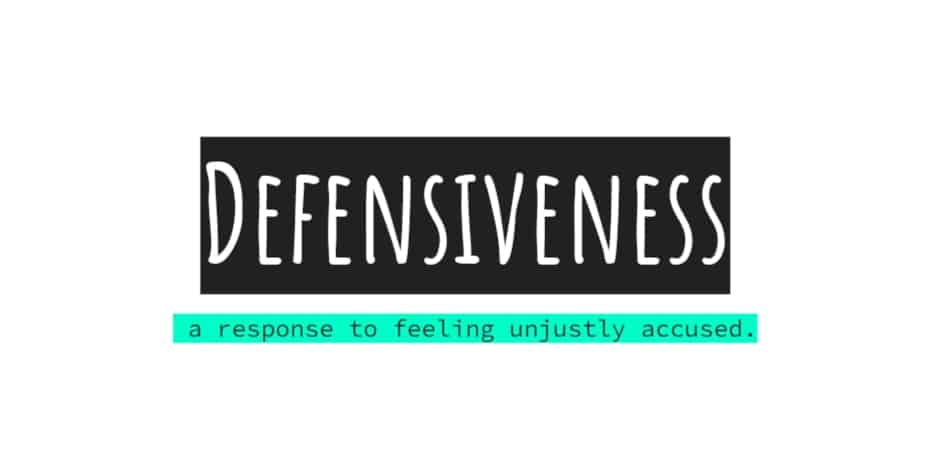
Then we have defensiveness which is typically a response to criticism. We’ve all been defensive. In my personal and professional opinion, this style of communication is the one that’s most innate and most common. When we feel unjustly accused, it’s natural to want to defend ourselves and stick up for ourselves and defend our honor. However, when it’s done in a way that is unproductive, it can appear that we are fishing for excuses. It can kind of come off as that we’re trying to be the victim or play the victim and kind of place blame back on our partner.
Unfortunately, this style of communication is almost never successful. Sometimes the excuses will come off as making our partner feel as if we don’t want to take responsibility or own up to our mistakes. Although it’s perfectly understandable to defend yourself if you’re stressed out or if you’re feeling attacked, it will escalate the conflict.
Usually, when we’re engaging in that type of conflict with our partner, we want to develop strategies that will de-escalate the conflict.
Here is an example of defensiveness:
Question: “Did you call Jim and Suzy to let them know that we’re not coming tonight as you promised this morning?”
Defensive response: “No! I was too busy today. As a matter of fact, you know just how busy my schedule was. I’ve been booked with meetings all week. Why don’t you just do it?”
So the person kind of perceived that as a negative attack against them and kind of got defensive. Deflecting the energy, putting it back on their partner, making excuses, and not really owning up to their part in that.
Stonewalling
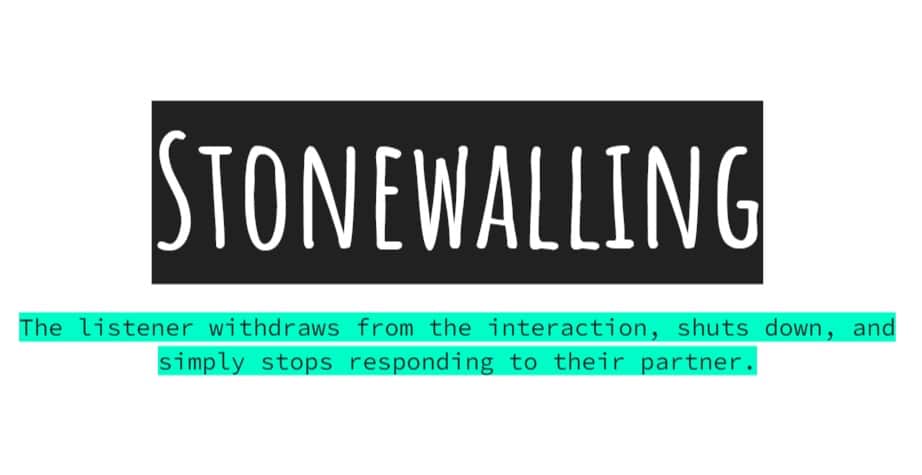
Stonewalling is the fourth horseman, which is usually a response to contempt. It occurs when you or your partner withdraw. Usually, this is due to an overwhelming and unmanageable amount of emotions that arise within yourself. During that interaction, whether your partner is being contemptuous or whatnot, you just have a surge of emotions that can become unmanageable so you shut down and stop responding or your partner shuts down and stops responding.
Rather than confronting the issue, people who stonewall will make evasive maneuvers to get out of the conversation, whether it be just completely going silent, turning away, acting busy, or engaging in something that’s distracting from that conversation. And once again, that is just a response to the emotions and not being able to manage the emotions that are coming up during that escalation.
Antidotes

I asked you to kind of tally up how many of those four horsemen you noticed either in your current relationship or past relationships, whether it be you or your partner who’s engaging in those styles. The idea is that just because you engage in these communication styles, it doesn’t mean that your marriage or your relationship is immediately doomed. However, and I always stress this with great importance in my sessions with my couples, those who engage in these styles without awareness and without motivation or willingness to change, might run into some concerns. So we want to make sure that now that we’re kind of aware of these horsemen and we are aware of these negative styles of communication, that we are proactive about it. We make intentional efforts to reverse those styles.
The good news is that for every horseman, there is an antidote that you can learn how to use when you are in these types of escalations with your partner. This is one of the resources that I’m going to make sure gets to you after our session so you don’t have to worry about writing all of this down.
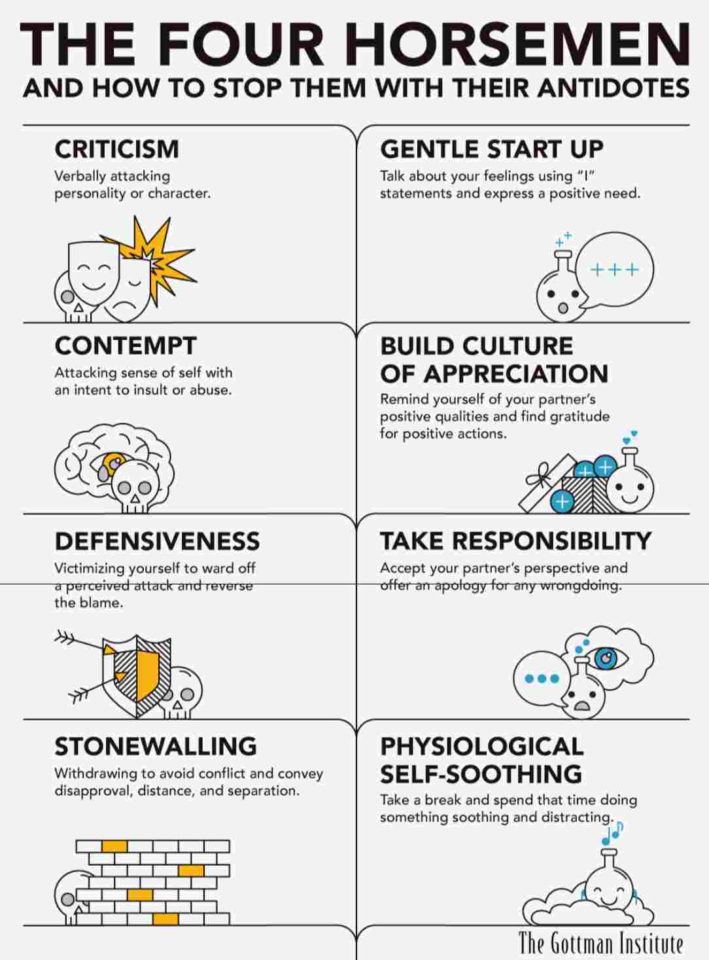
Source: https://www.gottman.com/blog/the-four-horsemen-the-antidotes/
Antidote to Criticism
As I explained, each horseman has an antidote. We’re going to start with criticism. As I mentioned, criticism is verbally attacking your partner’s personality or character. The antidote for criticism is to complain without that blame by using a gentle startup approach. So it’s OK to complain, it’s OK to voice your concern, and it’s OK to have an opinion, but we want to do so in a way that is productive and is not targeting our partner.
Avoid saying you, which can indicate blame. Instead of talking about your partner, maybe use “I statements” to express what you feel and what you’re needing. When you’re using the gentle startup approach, make sure that you’re talking about yourself as opposed to your partner. What do I feel? What do I need? Instead of starting off by telling your partner what you think they’re doing wrong, start off with the “I statements”: I feel I’m making up or I believe that etc. Starting with the I statements helps soften your concerns and helps to prevent your partner from becoming guarded or ready to engage in an argument.
Antidote to Contempt
The antidote to contempt is to build a culture of appreciation. This might be very hard to do if you’re already feeling pretty contemptuous about your partner but there are a few ways that we can do that. One of Gottman’s models is “small things often”. So if you regularly express appreciation, gratitude, affection, and respect for your partner, you’ll create this positive energy and positive perspective in your relationship that will act as a buffer for those negative feelings when they do arise.
Gottman believes that your relationship at any moment is in one of two states. It’s either from a positive perspective or a negative perspective. The more positive you feel and express those feelings, the less likely you will feel or express contempt and the opposite. If I’m constantly stating negative things to my partner, our relationship is going to stay in a state of negative energy. However, if we work hard to create a culture of positivity by expressing our love, expressing our gratitude for each other without being prompted or asked to do so, that can really redirect how the two of you guys are feeling about each other.
Another way to explain this is the five-to-one ratio of positive to negative interactions that a relationship can have to succeed. If you have five or more positive interactions for every negative interaction, then you’re making really solid, positive, emotional energy. You’re really depositing that emotional energy into your relationship, which keeps it positive and healthy.
Antidote to Defensiveness
Defensiveness is described as victimizing yourself to ward off a perceived attack and reverse the blame. The antidote to this is accepting your partner’s perspective and offering an apology for any wrongdoing. So this is easier said than done because once again when we feel criticized when we feel like our personality or character is being attacked, we want to stand up and defend our honor.
Usually, though, it’s the ego that gets in the way of partners being able to take responsibility. We are too caught up in being who’s right or who’s wrong as opposed to owning our part in a disagreement. A lot of work I like to do with my couples is breaking down those barriers so we can really see each other.
Defensiveness is described as victimizing yourself to ward off a perceived attack and reverse the blame. The antidote to this is accepting your partner’s perspective and offering an apology for any wrongdoing. So this is easier said than done because once again when we feel criticized when we feel like our personality or character is being attacked, we want to stand up and defend our honor. Usually, though, it’s the ego that gets in the way of partners being able to take responsibility. We are too caught up in being who’s right or who’s wrong as opposed to owning our part in a disagreement. A lot of work I like to do with my couples is breaking down those barriers so we can really see each other.
Antidote to Stonewalling
The next one we have is stonewalling. Stonewalling is when someone completely withdraws from a conflict, and shuts down, whether that be walking away or distracting themselves This usually happens when you’re feeling flooded or emotional or overwhelmed, so your reaction is to shut down, stop and disengage.
The antidote to this is to do some self-soothing. One of the strategies I like to encourage my couples to do is take a break. If you feel that your heart rate beginning to rise, or you feel your muscles beginning to tense up during a conversation, it’s okay to say: “You know what, time out” or maybe you guys come up with the key or code word that you can throw out when you just need to take a break.
The key, though, is if you take that break, you have to come back to the topic.
It’s not okay to take a break and never revisit it. I don’t recommend taking a break and never coming back to that concern because usually, that leads to sweeping matters under the rug. The more we sweep under the rug, the more resentment we built up for each other, and that always will come to a head at some point.
So there’s a question in the chat. I really want to answer this question now. I know I said I was going to take them at the last 20 minutes, but I want to go ahead and answer this now.
What if your partner is contemptuous with you? Will showing appreciation for him help redirect his contempt eventually?
It will, hopefully, but he also needs to be aware that he is doing that. He needs to be aware that that behavior is hindering your relationship and hindering your communication with each other. I always say relationships are a two-way street. It’s never one person, except in extreme cases of abuse or addiction, et cetera. But usually, in most cases, it takes two to tango. The first step is awareness: If we are not aware that we’re engaging and these four communication styles, then we don’t have the ability to bring attention to it, and we don’t have the ability to redirect it. I would encourage you in some way and maybe through counseling sessions, we can bring a safe space to bring awareness to that contemptuous behavior.
The Seven Principles for Making Marriage Work
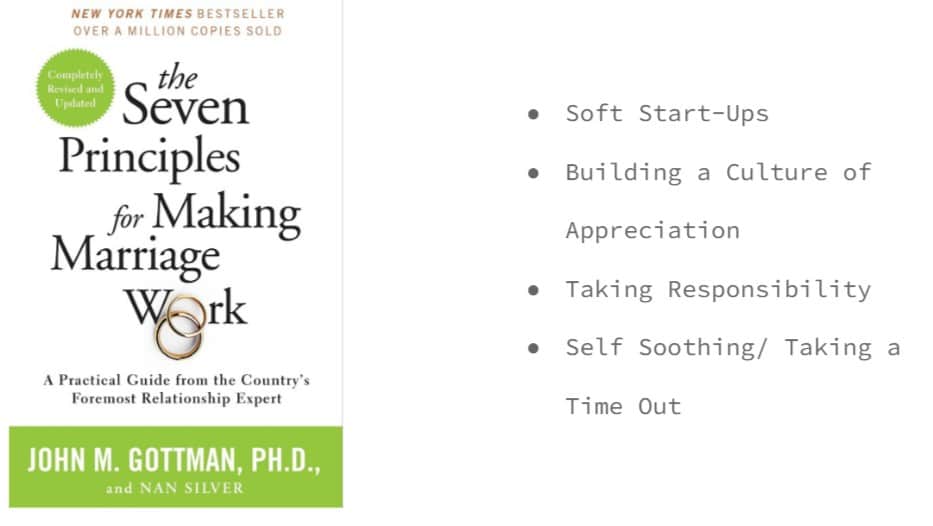
In summary, those four strategies are criticism, contempt, stonewalling, and defensiveness. Then we have those antidotes we just went over that you can use to combat that unhealthy communication patterns in your relationship. This is something that you don’t really feel like you can take and just apply because you feel like maybe your partner doesn’t have that awareness. That is when I really encourage you to try to get your partner into a safe space, into a counseling session where we can explore and unpack that so we can really have some productive conversations about those communication styles within our relationship.
If you enjoy reading, I want to encourage you to take a look at Dr. Gottman’s book “The Seven Principles for Making Marriage Work”. In this book, Gottman will go into more detail about some of the key concepts I just found over the Four Horsemen antidotes, as well as the concept of having a positive perspective or negative perspective in your relationship, in what that looks like, and the key tips to navigate through if you do have that negative energy, negative perspective, and if that’s dominating your relationship. It’s a good and easy read, very simple. So find it on Amazon.
Imago Dialogue

In addition to the Gottman techniques, another research-based strategy that I love to use with my couples when I’m helping them create a culture of healthy dialogue in their relationship is the Imago Dialogue.
This was developed by Dr. Hendrix and Dr. Hunt in 1980. Imago relationship therapy is a form of relationship and couples therapy that focuses on relational counseling to transform any conflict between couples and to opportunities for healing and growth.
The word “imago” is a Latin word meaning image and refers to the unconscious image of familiar love. What we find is that there is a frequent connection between frustration and adult relationships and early childhood experiences. Those are always in some way linked together.
As an example, individuals who are frequently criticized as a child will likely be highly sensitive to any of their partner’s criticism. When these core issues repeatedly come up with our partner, they can overshadow all the good in our relationship and leave us wondering whether we chose the right person and whether this is the relationship that we want to stay in.
What I really love about the Imago Dialogue is that it cuts through everything else. It’s not about “a loaf of bread”, or “you forgot to put gas in the tank”, it’s not about “you left your shoes on the couch” or “you forgot to walk the dog”. It’s really not about those things. So, it’s about the emotions underneath. When we cut through all of that and have a conversation about really what this is representing and really what this is meaning for us, then we’re being more productive. Those messages are a lot easier to hear from each other. And those four horsemen are usually a lot less likely to present themselves within that dialogue.
Sender and Receiver

In the Imago dialogue, both parties have to agree to a basic ground rule, which is one person is to talk at a time. This means in every conversation, there is a person who is speaking or sending a message and another person who is listening or receiving the message. Each role requires a different set of skills and strategies that, when done intentionally and with fidelity, can promote healthy and productive dialogue.
The key to this is that you’re not going to get it right on the first attempt. It takes a lot of practice and a lot of intention. It also takes a lot of goodwill and a lot of assuming goodwill in your partner to really get this. What you’re really doing is you’re developing new habits in your relationship. It takes time to develop new habits. It’s going to seem awkward at first. Talking in this way is going to feel very uncomfortable. You’re going to feel very vulnerable. The idea is that with time and the more practice, the more you practice and the more you try it with fidelity, the more it becomes ingrained in your relationship.
The Sender
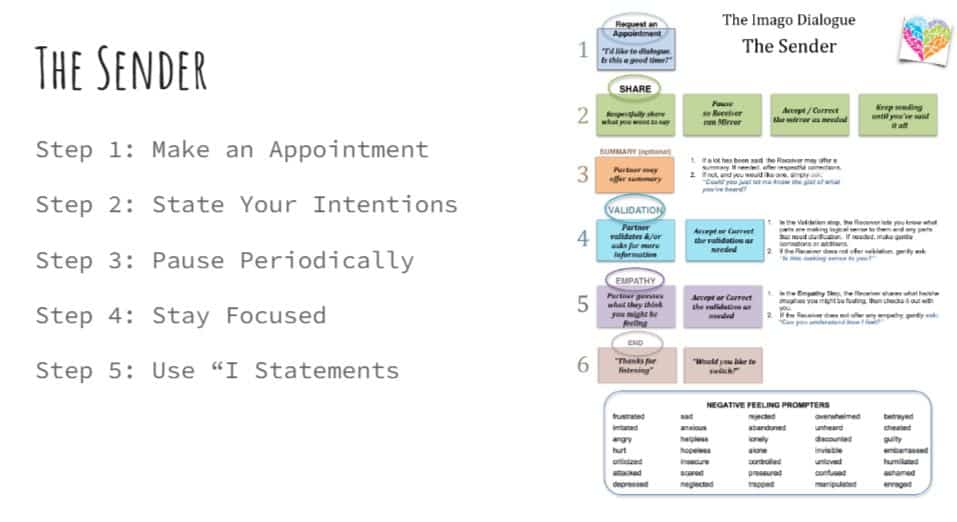
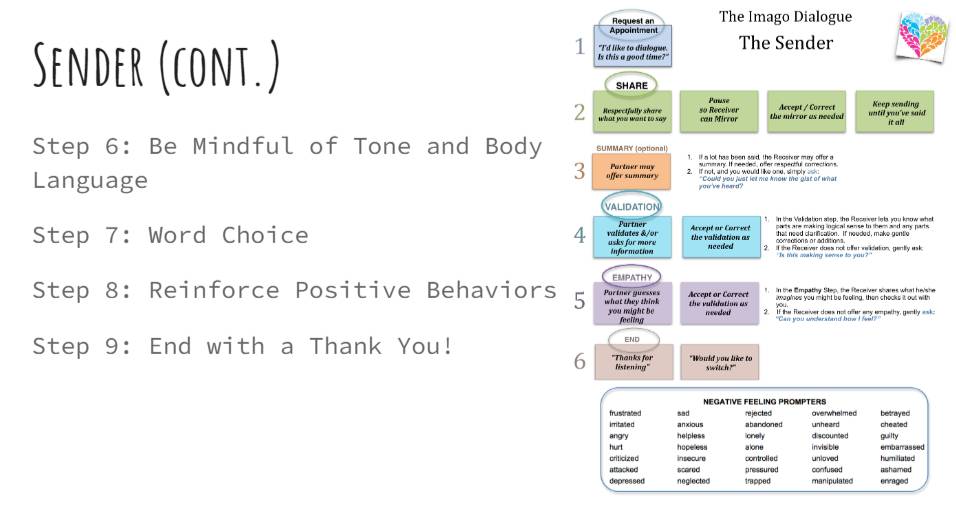
We’re going to start with the Sender. The document that you see on the right-hand side of your screen, that’s going to be sent to you as a follow-up email. This is the actual document that I give to my couples. There’s a Sender document and there’s a Receiver document. I’m going to go over that in just a second. I literally tell my couples: “Keep this in your hand, put it on the refrigerator and when you want to have a conversation, pull this out and use them to guide yourself.
Once again, it’s uncomfortable, weird and it’s awkward in the beginning but what you’re doing is you are developing new behaviors. You’re developing new behaviors you’re developing a new culture in your marriage. So that’s going to take some time. Be compassionate with yourselves as you’re learning this, too.
Step 1: Make an Appointment
The first step in engaging in a critical conversation or engaging in any type of communication that could possibly escalate into an argument is to request an appointment. It’s important to invite your partner to dialogue. So now this may seem very strange, but imagine spending over eight hours at work and maybe another hour stuck in traffic on the way home. You’re exhausted, you’re burnt out, and you barely have enough energy to get out of the car. Imagine walking through your front door and being bombarded with questions and concerns from your spouse.
Chances are you’re not going to be in the proper frame of mind to engage in those intense types of conversations. So this is why it’s important to request an appointment with our partners. The first step is asking: “Is this a good time for us to talk? I have something important that I would like to share with you, is this a good time?” If your partner says “No”, you want to respect their answer and then ask them to let you know “When is a good time?”, “Maybe in the next twenty-four hours, when would you be willing to have this type of dialogue?”
It’s important to indicate who will establish coming back to it, and who is going to be the one to bring it back up.
If we say: ”Let’s talk about this tomorrow”. That way someone will actually take the lead and the conversation doesn’t just get brushed under the rug. Once we invite our partner to dialogue, we always want to make sure we’re not doing this while one person is cooking and the other person is vacuuming or one person is in the shower and the other person is doing their makeup. We’re doing this when we are sitting down, we’re looking at each other face to face, and we’re giving each other attention and respect. We’re creating a space of respect and creating an environment that feels comfortable to communicate in.
Step 2: State Your Intentions
The next step is to state your intentions. Begin with the introductory statement that helps your partner feel safe about what and how you’re going to share. “I want you to know that I’m sharing this with you because I care about our relationship” or “I want the outcome of this for us to be that we both feel like we get something out of this.”
Step 3: Pause Periodically
Make sure you’re pausing periodically so that your partner has a chance to take this in.
Step 4: Stay Focused
You want to stay focused. You want to avoid rambling or going down a side road. Stick to the topic and make sure that you stay on one topic, one topic per dialogue. We’re not going to have a whole list of stuff that we want to share with our partner. When we make this appointment, we’re going to go over one topic, worked through that, and then maybe I’ll invite them to a dialogue at another time.
Step 5: Use “I Statements”
Make sure you’re using “I statements”, that help your partner become less guarded and help them become less tense and less defensive. So just make sure you’re using those statements as opposed to using statements such: as “You don’t care about my feelings. You make me feel…” or things like that nature.
Step 6: Be mindful of your tone and body language.
This is very important. You can do all those steps one through five correctly, but if you have an attitude, your body language is off-putting, or your tone is aggressive, it’s not going to matter. The message is not going to come off well intended. When we are requesting this appointment, we want to make sure that we’re not doing it five minutes after we got off work or five minutes after a stressful situation. We want to make sure that we’re setting up a time where we both can be, you know, relaxed.
Step 7: Word Choice
Also, be mindful of your word choice.
Step 8: Reinforce Positive Behaviors
Reinforce your positive behaviors from your partner. That’s very important if they are saying things like: “I get you” You want to say “Thank you. I appreciate it. You’re really hearing me right now.
Step 9: End with a “Thank You”
Then, end with a thank you. You always want to be appreciative. The idea is really building a healthy culture within your marriage.
So once again, I start off by saying that some of this might seem awkward. We’re not taught to communicate like this with each other so it does seem awkward at first. The idea is that you’re really being mindful of your setting, you’re being mindful of your body and of the words that are coming out of your mouth. You’re being really mindful of the message that you’re communicating with your partner. Just so you know, if you’re the Sender, you have an easier job.
The Receiver
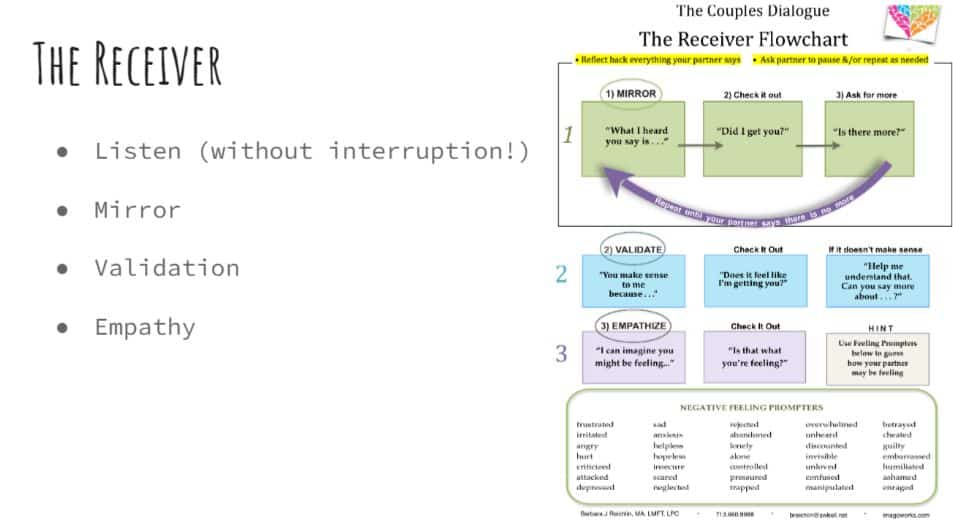
The Receiver, in my professional opinion, has the hardest part.
Step 1: Listen (Without Interruption!)
The first step is for the receiver to listen without interruption. While the sender is doing all of this talking, I want to encourage you to keep your composure, keep your restraint, and really listen to what your partner is saying. And most importantly, do not interrupt. It takes a lot of restraint and composure to have the ability to validate and empathize. Those are skills that don’t come to us naturally so we have to make sure that we are really paying attention to them.
So once again, the flow on the left-hand side will be sent to you as a follow-up. And like I said, when you get it printed out, don’t feel awkward having sheets of paper in front of you when you’re communicating with your partner. You’re developing a new culture when you’re learning something new. When you’re trying out a new recipe, you have the recipe in front of you. Be compassionate with yourself. You’re developing new patterns in your relationship.
So start with listening as your partner speaks. Listen, without interrupting until he or she pauses and then maybe ask: “Is it okay for me to talk right now?” or “Are you ready for me to respond?”
Step 2: Mirror
Then when you do respond, the first thing you want to do is mirror. Mirror what your partner said, and make sure that you’ve got it and you understood what they said. “What I heard you say is…, Was that right, that I repeat it back to you? That I get the point that you were trying to make. If I didn’t get the point you were trying to make, can you help me understand it? Can you clarify or maybe say differently?” I love using the phrase: “Can you say that in a different way?”
Oftentimes when I don’t understand what people are saying or maybe what they’re asking of me, I’ll ask them to say it differently.
Step 3: Validation
The next thing to do is to validate. At the end of the day, all of us just want to be validated in our actions. We want to be validated in what we say to each other. We want to be validated in our relationship by a partner so validate the content of what our partner saying.
Validation is not about an agreement. It’s about letting the other person know that you understand them and that you what they’re saying makes sense from their point of view.
It’s not about you and it’s not about your opinion. But, it’s about what makes sense for them. None of us are in a position to tell someone else how they should feel, what they should be feeling. That’s for them so let them have that. Let them give them the space and have enough respect for them to feel the way that they need to feel regarding whatever situation. And hopefully, that can be reciprocated to you as well.
If what your partner is saying doesn’t make sense, once again, ask them: “Help me understand. Could you tell me more about this? Maybe say differently”, and then once again, mirror to make sure you’re getting it all right.
Step 4: Empathy
Have empathy. Empathizing means you’re trying to imagine what another person is feeling about what they are saying or experiencing. If you have trouble empathizing, try to imagine how it might feel if the tables were turned or try to recall a time when someone did something to you that was similar to what your partner is describing.
Although you may have had a completely different reaction than what your partner has had or you think you might have had a completely different reaction is really beside the point. The fact of the matter is that your partner is feeling this way and we want to give them the space. We want to be respectful enough to give them the space to allow them to feel this way and let them know that we really hear them. And, you know, their opinion, words, and feelings have a place in this relationship.
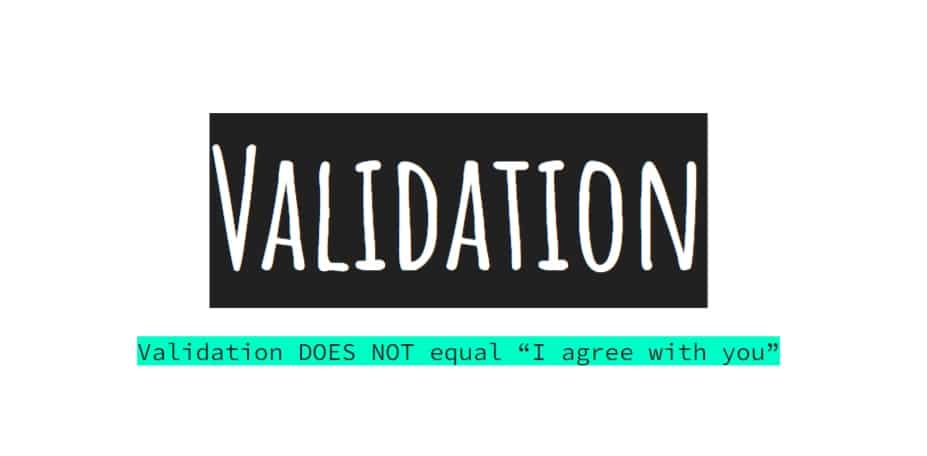
Once again, I want to emphasize that validation does not mean I agree with you.
When you’re validating someone, it’s not about you being right.
It’s not about: “I wasn’t right. I was wrong.” It’s about: “I hear you, I get it, I understand how you could feel that way. I understand how that can make you feel that way. It may not make me feel that way, but I could understand how it would make you feel.”
This is not something that it is not something that comes naturally to us. When I work with couples, I have them pull out the sheet. First of all, I have them bring it to every session just so we can make sure that we’re practicing this. The idea is to really get it ingrained in ourselves, get it ingrained in our communication to where it’s natural and it doesn’t feel awkward. “I don’t want to bust out laughing when I’m doing it. I’m able to take my partner seriously.”
Summary

In summary, we went over the four horsemen, and we went over the antidotes for that. Once again, you’ll be getting follow-up resources for those and you will also be getting resources for the Imago dialogue.
Questions

I want to leave now some time here for questions. If anyone has any questions, feel free to type them in the field or type them in the chat if you want to. I am happy to answer those. If you need me to go over something again if you need me to go in more detail about something, I’m happy to do that as well, just let me know.
The Gottman study
What Gottman did was he set up this house where couples were staying. It was a long-term research study. He had couples staying overnight and he had a camera set up. He did a couple of sessions with them, and also did individual sessions with them. And he really got it down to a science and was able to predict by studying their behavior, studying how they work towards each other and that’s where he developed those four horsemen from. Studying allowed him to kind of predict which marriages were going to be successful and which weren’t.
I’m going to encourage you to really get that book. If you’re also doing a Google search on Gottman, probably one of the first things that come up will be about his study.
Example of the Imago Dialogue
One of the examples that I like to give is an example of what happened to me and my husband. So, he gets up in the morning and he rushes off to work, doesn’t say anything to me, doesn’t say I love you, doesn’t give me a kiss. That brings up feelings for me.
Once again, the experiences that we have in our childhood usually mirror how we react to certain situations in our adult life. So for me, that brings up feelings of insecurity and makes me feel like I’m not loved or he doesn’t care about me. A lot of emotions might come with that. We might become angry, we might want to curse at our husband: “You don’t care about me, you don’t give a crap”, etc.
Instead of doing that, I would encourage you to dialogue. So when my husband was on his lunch break, I might send him a text message or call him: “Hey, do you have time for a conversation tonight or when would you have time?” (Step one – Invited them to dialogue.) And in the second step, you guys are sitting down that intention. You really want to have this conversation about something that’s really got to you this morning and you just want to be heard.
Make sure that you both walk out of this conversation on the same page.
“This morning when you left for work, I felt as if you did not care about me. I felt as if I wasn’t cared for and I wasn’t loved. When you left hurriedly and didn’t give me a kiss, you didn’t do what you typically do: You give me a kiss and you tell me I love you. You just rushed out the door”. So, be very intentional and open about how they made you feel, and then pause for your partner’s response. “
I would want for your partner to respond by mirroring back: “So what I’m hearing you say is that when I left this morning for work without kissing you and without saying I love you and made you feel as if I didn’t care about you or that I don’t love you”. I will either say that’s correct or say or clarify that.
Then I want my partner to validate me. I would want him to understand how rushing out the door without kissing you can make you feel that way. I see how that makes sense to me. And then I would want for him to empathize with me.
“I can imagine how that would make you feel sad or frustrated or irritated. You know, those were my intentions, I was super late. But, you know, regardless of that, it wasn’t my intention to make you feel that way. And I’m really sorry that that happened.” Probably I kind of rushed through that, but hopefully, that gives you an idea. Hopefully, that was helpful. And once again, it’s not something that comes naturally.
What impact do phone addictions and social media have on communication issues with couples?
I know in my example, I said to text and ask your partner for dialogue. Actually, I want to take that back. Any time you’re having an important conversation, I would not do it through text. Always verbal over the phone conversation is best. I don’t have enough knowledge to talk about social media’s impacts on communication between couples, but I’m happy to do some research on that and get back to you on that.
If your partner asks for separation and isn’t communicating with you, what do you recommend to initiate conversation?
At that point, I would recommend for the two of you guys find a safe space within therapy, to have a conversation and unpack a little bit more about your partner’s request.
What if your partner gets upset each time there is a traumatic issue between the two of you from the past? (when it’s hard not to do contempt or criticism and he’s stonewalling)
When someone is stonewalling, you want to allow them to cool off. If he’s stonewalling, that means that his emotions are too much for him to deal with. So you want to be respectful of that and give him the break that he needs. But of course, we always want to come back to that one partner has cooled off.
Then I would highly encourage you to try some of the antidotes or really try using that cinder flow to try to communicate what you’re feeling when this issue keeps being brought up between the two of you.
What if your partner doesn’t want to have a two-way conversation?
I want I would encourage you to find a safe space in therapy. When it comes to that part, to the point where your partner doesn’t want to talk to you. If your partner’s asking for a separation, it’s going to be very difficult for you to implement any of these techniques. So I would encourage you at that point to try to find a safe space in therapy to unpack some of that.
For the Imago example, pretend like one person in the relationship is frustrated and the other one is not keeping the house tidy:
I’m going to encourage you to bring that up, invite your partner to dialogue when you’re not frustrated, and really talk about how it’s making you feel. What feelings are coming up for you when they overlook the things around the house and are not keeping your space clean? I don’t want to say that at the end of the day, it’s not about the house being tidy. It might be about feeling disrespected, or something deeper than that. I would encourage you to try to get to the root of the feelings and talk more about the feelings in that situation.
My partner always stonewalled, but never wanted to go back and address the issue. I always had to bring the issue back up and it always seemed to start an argument that ended up just sweeping it under the rug most of the time, to avoid the argument. What is a better way to approach this?
My first question to ask you is when we’re bringing it up, are we waiting for a point when both of us are more relaxed? Are we being mindful of our tone and of our body language? If you’re doing all the things that you need to do as a Sender if your partner is still struggling with that, I really want to encourage you to find a safe space in therapy.
Sometimes it’s hard to figure out these things on our own and sometimes it takes a third person, an unbiased person, to bring awareness to something for our partner or for ourselves.
Besides taking your break when flooded, any suggestions, if you are aware you stonewalled, that can be utilized during the communication to help stay engaged?
Don’t feel like it’s a bad thing to take a break. That’s going to be my first recommendation because that allows you to really be mindful and intentional with yourself-soothing techniques. Sometimes it can be very difficult to self-soothe in front of your partner.
When I think about self-soothing, if I do have to do it in front of someone or if I do have to do it in front of my partner it will be really hard. When I self-soothe, I need to have dialogue in my head. I’m telling myself that “it’s going to be okay, just breathe” and if my partner is talking, I’m not going to be able to tell myself those things.
So I want to encourage you to take a break. I want to encourage you to do some relaxation techniques, really try to make your body become intense, really become more aware of the emotions that are going through your body, and become aware of where you’re feeling those emotions in your body. If that’s too advanced for you, simply just distract yourself until the tenseness, anxiety, frustration, and anger go away until you feel like you can re-engage in that type of dialogue.
Dr. Gottman’s experiment is really good and the book Blink by Malcolm Gladwell. Matter of fact, Malcolm Gladwell is another really good expert in marital therapy. So if you won’t pick up some of his books, that would be good as well. This is a great example.
I find myself being contemptuous towards my husband, husband and having a hard time changing that. What do you recommend?
I would recommend doing some journaling about that. I would recommend doing some reflection about what about him is causing these negative thoughts. What about him is really making you feel that type of energy towards him? Is this something that’s been festering for years? Is this something that’s festering because of past behavior?
I would be curious to know more about what has led to that contemptuous behavior because you weren’t always that way. You guys had a honeymoon stage. You guys were lovey-dovey at one time. When did you notice that you started to change? What was going on during that time?
When we are really feeling contemptuous about someone I really want us to reflect on what is it about them that’s really hurting us and making us disrespectful and having those bad thoughts about them.
My partner gets defensive and tends to ignore me for days, how can I approach him?
I would try to bring awareness to this. Once again, the first step is awareness. If you try to bring awareness to some of your concerns and you’ve done it long enough to the point where you realize that your partner is just not going to get it that’s when it’s really time to find that safe space, to have that third person really come in and help unpack some of that stuff for us Sometimes it’s helpful for someone else to bring awareness to some of those behaviors. He’s done what he’s stonewalling to if he’s ignoring you for days.
Do you feel like stonewalling is an action that stems from childhood and now uses as a coping mechanism?
It’s definitely a coping mechanism because, for whatever reason, we’re unable to deal with the flood of emotions that are coming toward us. I really haven’t done enough research specifically if stonewalling stems from childhood. I would say that probably in a handful of situations, I would think most behaviors or feelings that we have and arguments might stem from how we may have been treated in our childhood or how things were handled or addressed in our home, how things were communicated to us as a child. So absolutely, I think that can be a reflection of that.
You’re not in this alone
If you’re really feeling scared to implement some of these antidotes and you’re feeling scared to try that Imago dialogue with your spouse, you don’t have to try it alone. This is something that we are trained in. So please book an appointment with one of our clinicians. We’re happy to support you and you’re not in this alone.
And be compassionate with yourself. We don’t communicate like this. We don’t learn to communicate like this. So, you know, be compassionate with yourself as you’re learning to do this. And always remember, it takes two to tango.
Thank you so much. I appreciate you guys. This was a great turnout. I hope this was helpful. Please reach out. My email address is in there, reach out if you need me. I’m happy to explore some more of these questions that you might have about this session. Thank you, guys. You guys were a great audience. I appreciate the participation in the questions at the end there. They’re very nice. Awesome.
Grounding & Self Soothing
Get instant access to your free ebook.









